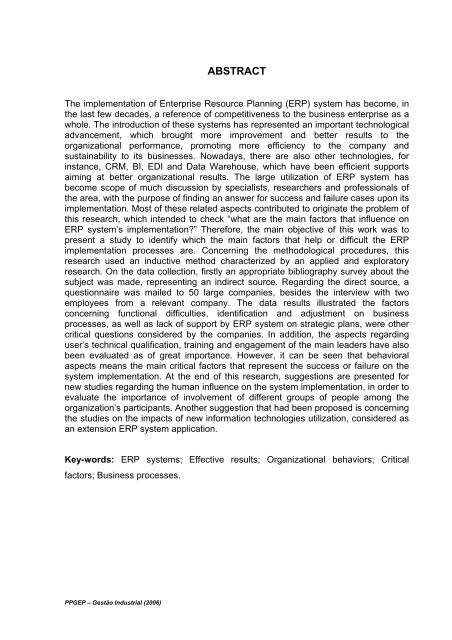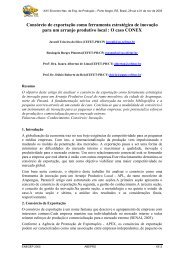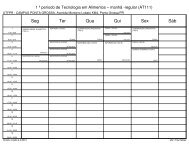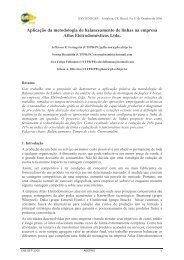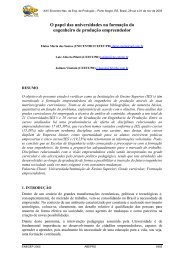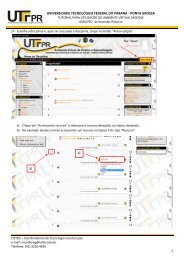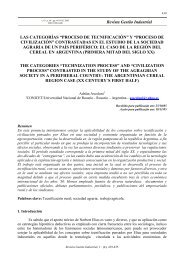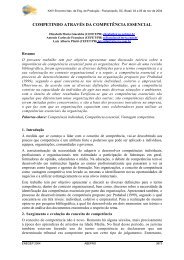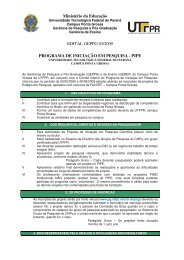RESUMOA implantação <strong>de</strong> sistemas Enterprise Resource Planning (ERP), a partir das últimasdécadas do século XX, tornou-se <strong>um</strong> ícone <strong>de</strong> competitivida<strong>de</strong> no cenárioempresarial. O surgimento <strong>de</strong>sses sistemas representou <strong>um</strong> importante avançotecnológico com vistas a aprimorar e elevar o <strong>de</strong>sempenho organizacio<strong>na</strong>l,oferecendo às empresas maior eficiência e sustentabilida<strong>de</strong> ao negócio. No contextoatual, outras tecnologias, tais como: CRM, BI, EDI e Data Warehouse tambémpassaram a incorporar e dar suporte ao ERP, tor<strong>na</strong>ndo mais eficiente a suautilização e refletindo no alcance <strong>de</strong> melhores resultad<strong>os</strong> para a organização. Anotável expansão d<strong>os</strong> sistemas ERP gerou muitas discussões entre especialistas,pesquisadores e empresári<strong>os</strong>, no intuito <strong>de</strong> buscar <strong>um</strong>a explicação para <strong>os</strong> divers<strong>os</strong>cas<strong>os</strong> <strong>de</strong> sucess<strong>os</strong> e insucess<strong>os</strong> <strong>na</strong> implantação <strong>de</strong>sses sistemas. As informações<strong>sobre</strong> esses fat<strong>os</strong> culmi<strong>na</strong>ram por gerar o problema da pesquisa, a qual preten<strong>de</strong>uverificar <strong>os</strong> <strong>principais</strong> <strong>fatores</strong> que interferem <strong>na</strong> implantação d<strong>os</strong> sistemas ERP.Assim sendo, objetivou-se apresentar <strong>um</strong> <strong>estudo</strong> para i<strong>de</strong>ntificar, <strong>na</strong>s maioresempresas industriais atuantes no Brasil, quais <strong>os</strong> <strong>principais</strong> <strong>fatores</strong> que contribuemou que dificultam o processo <strong>de</strong> implantação <strong>de</strong> sistemas ERP. Quanto àmetodologia da pesquisa optou-se pelo método indutivo, tendo em vista ser <strong>um</strong>apesquisa aplicada e exploratória. Para a coleta <strong>de</strong> dad<strong>os</strong>, utilizou-se como fonteindireta o levantamento bibliográfico apropriado <strong>sobre</strong> <strong>os</strong> assunt<strong>os</strong>. Como fontedireta, aplicou-se <strong>um</strong> questionário, o qual foi enviado a 50 empresas <strong>de</strong> gran<strong>de</strong>porte, além <strong>de</strong> <strong>um</strong>a entrevista com dois funcionári<strong>os</strong> <strong>de</strong> <strong>um</strong>a empresa consi<strong>de</strong>radarelevante nesta pesquisa. Os resultad<strong>os</strong> auferid<strong>os</strong> <strong>de</strong>monstraram que <strong>os</strong> <strong>fatores</strong>relacio<strong>na</strong>d<strong>os</strong> às dificulda<strong>de</strong>s funcio<strong>na</strong>is do sistema, i<strong>de</strong>ntificação e adaptação a<strong>os</strong>process<strong>os</strong> <strong>de</strong> negócio, bem como as carências do ERP no apoio a<strong>os</strong> plan<strong>os</strong>estratégic<strong>os</strong>, foram alguns d<strong>os</strong> pont<strong>os</strong> consi<strong>de</strong>rad<strong>os</strong> mais complex<strong>os</strong> pelasempresas. Ainda, outr<strong>os</strong> aspect<strong>os</strong> concernentes à qualificação técnica d<strong>os</strong> usuári<strong>os</strong>,trei<strong>na</strong>mento e engajamento das <strong>principais</strong> li<strong>de</strong>ranças, também foram consi<strong>de</strong>rad<strong>os</strong>relevantes. I<strong>de</strong>ntificou-se, no entanto, que o principal fator crítico e que concorrepara o êxito ou fracasso <strong>na</strong> implantação do sistema, está relacio<strong>na</strong>do com o aspectocomportamental d<strong>os</strong> colaboradores. Ao fi<strong>na</strong>l <strong>de</strong>ste trabalho, as sugestõesdirecio<strong>na</strong>ram-se para nov<strong>os</strong> <strong>estudo</strong>s acerca da influência do ser h<strong>um</strong>ano <strong>na</strong>implantação do sistema, bem como avaliar a participação <strong>de</strong> pessoas <strong>de</strong> outr<strong>os</strong>grup<strong>os</strong> envolvidas <strong>na</strong> empresa. Como sugestão adicio<strong>na</strong>l, propõe-se também <strong>os</strong><strong>estudo</strong>s <strong>sobre</strong> o impacto da utilização das novas tecnologias <strong>de</strong> informação,consi<strong>de</strong>radas <strong>um</strong>a extensão do ERP.Palavras-chave: Sistemas ERP; Resultad<strong>os</strong> Eficazes; ComportamentoOrganizacio<strong>na</strong>l; Fatores Crític<strong>os</strong>; Process<strong>os</strong> <strong>de</strong> Negócio.PPGEP – Gestão Industrial (2006)
ABSTRACTThe implementation of Enterprise Resource Planning (ERP) system has become, inthe last few <strong>de</strong>ca<strong>de</strong>s, a reference of competitiveness to the business enterprise as awhole. The introduction of these systems has represented an important technologicaladvancement, which brought more improvement and better results to theorganizatio<strong>na</strong>l performance, promoting more efficiency to the company andsustai<strong>na</strong>bility to its businesses. Nowadays, there are also other technologies, forinstance, CRM, BI, EDI and Data Warehouse, which have been efficient supportsaiming at better organizatio<strong>na</strong>l results. The large utilization of ERP system hasbecome scope of much discussion by specialists, researchers and professio<strong>na</strong>ls ofthe area, with the purp<strong>os</strong>e of finding an answer for success and failure cases upon itsimplementation. M<strong>os</strong>t of these related aspects contributed to origi<strong>na</strong>te the problem ofthis research, which inten<strong>de</strong>d to check “what are the main factors that influence onERP system’s implementation?” Therefore, the main objective of this work was topresent a study to i<strong>de</strong>ntify which the main factors that help or difficult the ERPimplementation processes are. Concerning the methodological procedures, thisresearch used an inductive method characterized by an applied and exploratoryresearch. On the data collection, firstly an appropriate bibliography survey about thesubject was ma<strong>de</strong>, representing an indirect source. Regarding the direct source, aquestion<strong>na</strong>ire was mailed to 50 large companies, besi<strong>de</strong>s the interview with twoemployees from a relevant company. The data results illustrated the factorsconcerning functio<strong>na</strong>l difficulties, i<strong>de</strong>ntification and adjustment on businessprocesses, as well as lack of support by ERP system on strategic plans, were othercritical questions consi<strong>de</strong>red by the companies. In addition, the aspects regardinguser’s technical qualification, training and engagement of the main lea<strong>de</strong>rs have alsobeen evaluated as of great importance. However, it can be seen that behavioralaspects means the main critical factors that represent the success or failure on thesystem implementation. At the end of this research, suggestions are presented fornew studies regarding the h<strong>um</strong>an influence on the system implementation, in or<strong>de</strong>r toevaluate the importance of involvement of different groups of people among theorganization’s participants. Another suggestion that had been prop<strong>os</strong>ed is concerningthe studies on the impacts of new information technologies utilization, consi<strong>de</strong>red asan extension ERP system application.Key-words: ERP systems; Effective results; Organizatio<strong>na</strong>l behaviors; Criticalfactors; Business processes.PPGEP – Gestão Industrial (2006)


